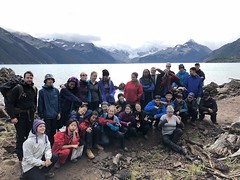The Great Identity Theft
By Julie, Kim, Sam, Tiffany, and Lori
17th century Canada, bold and bountiful, awaits the exploration and exploitation of those nestled inside the Manifest Destiny. Every valley, forest, and plain awaits a man with a gun in one hand and a bible in the other, ready to “civilize” his new found nation.
“To rid the world of red, and fill it with white”
Somewhere along the way, a people neither European nor Native formed: the Metis. The Metis balanced between two worlds. Like First Nations and Inuit, this nation possessed a distinct culture, with trappers and traders. Again, like First Nations and Inuit, the Metis endured years of oppression from the European settlers. But the theft of land, wealth, and family could not compare to the loss of a culture, spirit, and identity.
Join us as we follow the Metis’ infamous journey throughout the residential school system to uncover what was and still is The Great Identity Theft.Act I: Lori and Tiffany introduce the early development of the Metis people and their culture.
-
Act II: Julie and Kim explain the conflict between the Metis people and the settlers, and the consequences of the actions the settlers had on the Metis children.This act includes stories of poor conditions and abuse at residential schools. This act features Sam interviewing Mr. Jackson.
-
Act III: Julie and Kim discuss the long term effects the residential schools had on the indigenous people of Canada: First Nation, Inuit, and Metis. Identity.
Further Reading:
The Metis People of Canada
Residential Schools
Sources:
-See further reading
–http://www.youtube.com/user/Jojikiba?feature=watch (Sound Effects)
–http://www.youtube.com/watch?v=MUebuT9j7U4 (Canadian Metis Anthem)



Wow, great folks. I like the way you’ve framed your work and the powerful questions that obviously underlie your inquiry. This is “action research” and “embodied knowing” at its finest — quite raw, controversial and arguable at times, and exactly what we hope for in students questioning what they are learning. I like the use of media, metaphors, primary sources (would have liked more of these), and the back and forth between storytelling and dialogue about the issues. One of my students shared a powerful link with me — look up “We Were Children” on the APTN website. For future work, you might want to reference the historical thinking project (can be found on histori.ca). Thanks again for sharing this moving “construction” (do you have a name for this kind of project work?). I will share this with my students up in Prince George. This year, at least 7 of them have shared about their own relatives’ experiences at residential school (for 2, it was parents), mostly at Lejac.